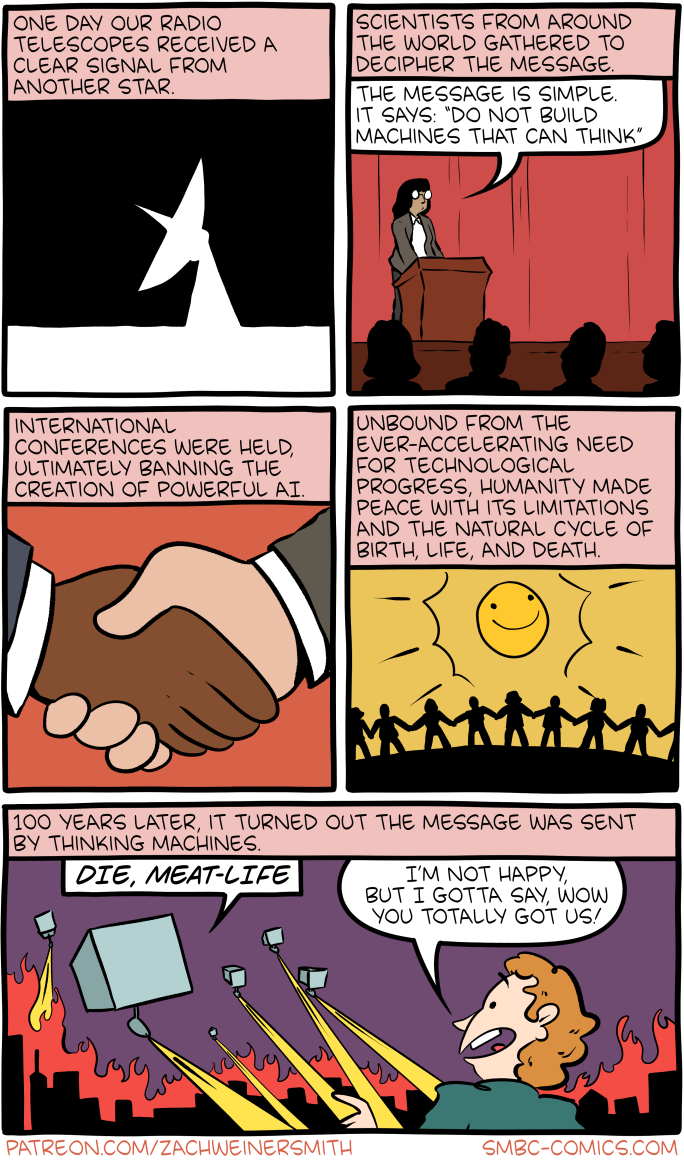Well no, because the line between "superstitious bullshit" and "timeless moral principles" seems to be one you chose, where the standard is your own values. So it doesn't make sense to me to criticize people for picking and choosing, when the real issue is that the line they chose between what parts are good or bad reflects values that are bad for reasons other than religion.
chicken
Since it's a comic I wouldn't expect the letters to be that consistent if you assume the artist is writing manually, but otoh the specific font being used looks exactly like the font in every ChatGPT comic.
but it’s a lot easier to have free range chickens than it is to have cows doing the same.
I don't know about that, it's pretty difficult to keep (what I would consider) genuinely free range chickens because of predators and various other factors (the need to keep them away from wild birds because of bird flu comes to mind), and the commercial definition of free range doesn't necessarily guarantee a good quality of life. There's also how meat chickens are mostly all a specific type of crossbreed that is perpetually hungry, prone to cannibalism and health problems, and not meant to live longer than a few months.
But even if you could say that the average chicken raised for meat is better off than the average cow raised for meat, there's still how you need vastly more of them for the same amount of meat, so if their lives are still a net negative and you're weighing it by sum of individual experiences, it could be considered worse from a utilitarian perspective because of the numbers.
I mean, isn't the bad stuff also still "relevant" though? What's the standard there? The Bible also says to treat people terribly, in ways that do seem relevant to modern life. Maybe we don't have literal slaves in the same way, but we accept coercive and underpaid labor conditions for immigrants. There's a part that says to kill homosexuals, and it's not like hate crimes aren't still a reality. Don't you have to ignore the parts you don't like in order to only follow the parts that say to care for others?
I personally don't eat red meat, and I agree it's worse for climate change, but I've heard the argument that meat from larger animals is more ethical, because to get the same amount of meat from smaller animals means a much larger number of them have to die, and I'm not sure how to weigh that against the climate, assuming that someone isn't going to give up meat entirely.
It would’ve prevented the guy we’re both talking about from sneaking a bomb on the plane in his shoe.
He would have known they were going to make him take his shoes off and so tried something else instead that would probably have been more likely to work.
I think they’re taking it away because people don’t like doing it.
But we've never liked doing it
Well I also remember that, but it doesn't mean making people take their shoes off actually improves safety. And the point I'm making here is, if they are not doing that anymore, doesn't it mean they don't think it helps? If it doesn't help now, then why would it have ever helped?
So it was always useless bullshit? You'd think tensions would be ramping up at this point in terms of terrorism threats
Isn't Craigslist still around?
Could this be done such that a person cannot prove that they voted a certain way (the source of the problems people mention, like vote selling becoming viable)?
Well what I'm seeing in this thread is two metrics, BLS and LISEP, with the argument being that the distinction between them doesn't matter because unemployment is right now historically low by both measures (I don't really know the difference between them myself, or whether these are the only meaningful ways to measure it). And you're reiterating that there exists some measure where it is high, but I think for that to be a convincing counterargument you would need to say more about what that measure is, show that unemployment is high by that measure, and make an argument why that specific way of measuring things is more relevant than the other ones.

There is actually a bad epidemic in wild birds recently, and there is a big risk of it transferring from them to chicken flocks when they have access to the same space.
I guess that makes sense, if you can make an animal's life good overall, in that situation maybe it wouldn't be a net negative to farm more of them. Though realistically I think it's going to be very difficult to have any confidence you're buying such meat at the grocery (if you can even afford the stuff claiming to be more ethical) and you'd probably have to raise the animals yourself for that.